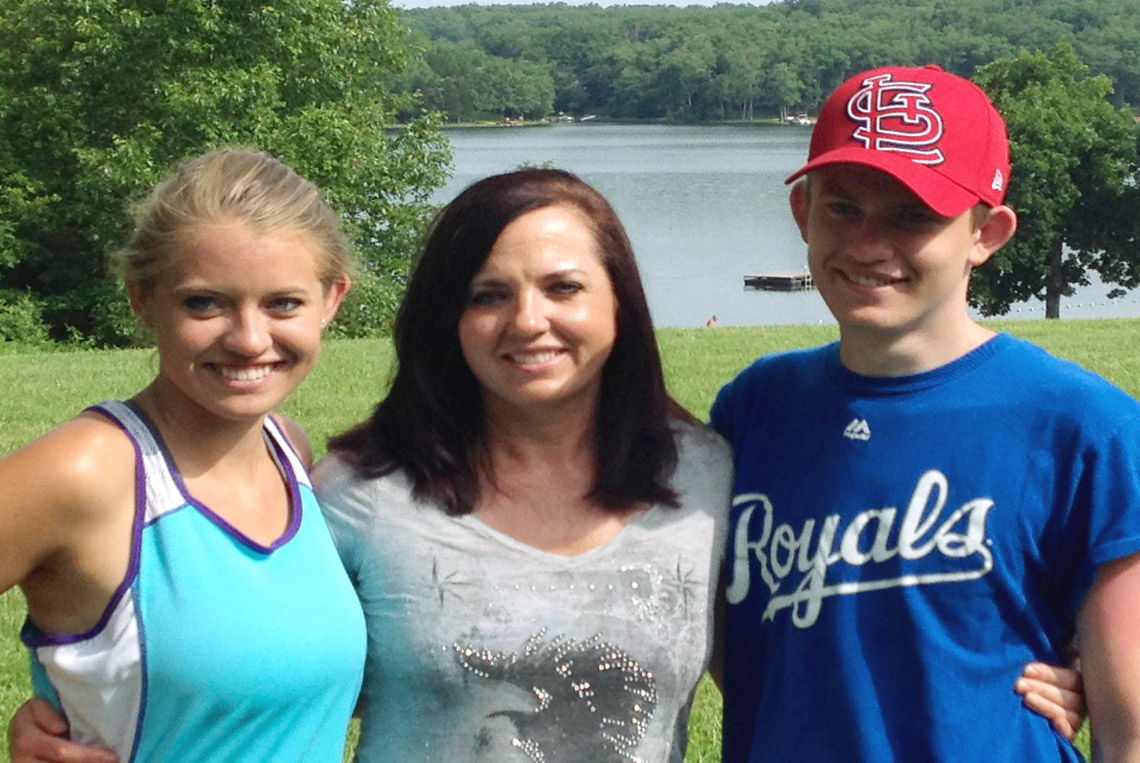andice is a hard-working, single mother of two amazing kids. To me, she is my sister and one of my very best friends. I've had the privilege to grow up with her together and then watch this strong and independent woman overcome many of life's obstacles, including being faced with a life-threatening diagnosis. Watching her go through this harrowing experience was hard enough. But seeing her have to navigate a dysfunctional health care system that increased her suffering revealed to me in a very personal way that our well-intentioned care is not designed to address what really matters to patients.
This picture of Candice and her two kids (above) was taken just shy of two years ago. Only two weeks later, Candice called me to say, "I found a breast lump." Candice was 47 at the time. As a single mom, she is the sole income earner for her family. Ultimately, she received care in an excellent health care system in the midwest, a system not too dissimilar from our own. Today, I'm glad to say that she is a cancer survivor.
The Patient’s Perspective
When she was ready, I asked her what surprised her about her care. I think you’ll find her observations powerful.
“What did other patients experience?”
At a minimum, I would have loved to be able to go online and get some information about what other patients think about their providers. Eventually, I heard from other patients in a breast cancer support group. It’s very powerful to hear about fellow patients’ experiences with the health care delivery system so that I can better make choices.
“How long am I going to wait?”
There were so many anxiety-ridden, sleepless nights - waiting for my mammogram, waiting for the biopsy, waiting for my diagnosis, waiting to meet with the provider to understand my chances of survival and my treatment plan. Waiting dramatically and negatively impacted my life and it fostered depression and anxiety. Waiting made it hard to take care of my kids and get back to work.
“Will someone explain things to me?”
I want someone to explain my options and the implications of each choice, in a way that I understood. After I learned my mammogram was abnormal, the doctor abruptly came into the room and said, "Go see a surgeon to get a biopsy. Looks like you have cancer. You're going to have a really crappy summer, but you'll be okay in the long run." It felt like he didn’t care.
“Does anyone consider what things cost?”
My insurance paid over $300,000 for my treatment. My out-of-pocket expense was $20,000. During the entire course of my treatment, none of my providers ever talked to me about this. In fact, there was even one moment when my doctor said, "Hey, there's a new study that recommends this medication.” I went to the pharmacy to fill it and the pharmacist said, "Your copay will be $800.” $800 a month, month after month, for years! I can't afford that. I went back to the doctor, who was shocked and said, "I had no idea it was that expensive. Here are some other options that cost less, and when we look at the evidence, these medications are probably nearly as good."
“What will my life be like after this?”
Mostly I wanted to understand what my outcomes will be. No one talked with me about the possibility of cognitive impairment as a result of chemotherapy, which dramatically impacted ability to do my job. There was no discussion or understanding about my long-term health or survival.
A Provider’s Reflection
I explained to Candice that health care doesn’t track most of these things. Instead, we track things like compliance with evidence-based practices. Her response was great. She said, "Well as a patient, compliance with evidence-based practices sounds like my minimum expectation. After all, you’re all trained to be doctors, right?”
At Utah, we really are learning from our patients and changing our practice. We know that choosing your care team is ultimately about trust. We’ve given patients more information about individual providers, so they can choose. Our system knows that waiting feels like systemic disrespect, which is why teams work so hard at reducing waiting – in waiting rooms, in exam rooms, for results. In radiology, Dr. Matt Stein and mammography team redesigned their care to provide same-day results and often same-day biopsies. Utah is committed to reducing the cost of health care through actionable, patient-level data that is available for individual providers.
Candice’s observations have changed my thinking. What if we thought about, measured, and then continually improved those things that matter for patients? How can her story, and the many others like hers, influence the care we provide?
Question for the Community:
For Bob, Candi's story illustrated how care doesn't often meet patient needs. What do you think? How can we change our practice to better meet patient needs? Please share your thoughts in the comments section below.
Bob Pendleton
Chrissy Daniels shares three powerful insights from Dr. Danielle Ofri’s new book, “What Patients Say, What Doctors Hear.” Ofri combines research and storytelling to explain the power of patient-doctor conversation and the common pitfalls that undermine connection and trust. She concludes the ear may be the most powerful tool in medicine.
Health care is full of high emotion—especially right now. Thankfully, there’s a simple framework we can follow to de-escalate with compassion. Hospitalist and UACT co-director Claire Ciarkowski introduces NURSE: a simple mnemonic for responding with empathy.
Hearing a patient is one thing—but actively listening to patients with empathy, understanding, and awareness is another. Nurse practitioner and headache specialist Susan Baggaley explores three trust-building techniques she employs to build relationships.
